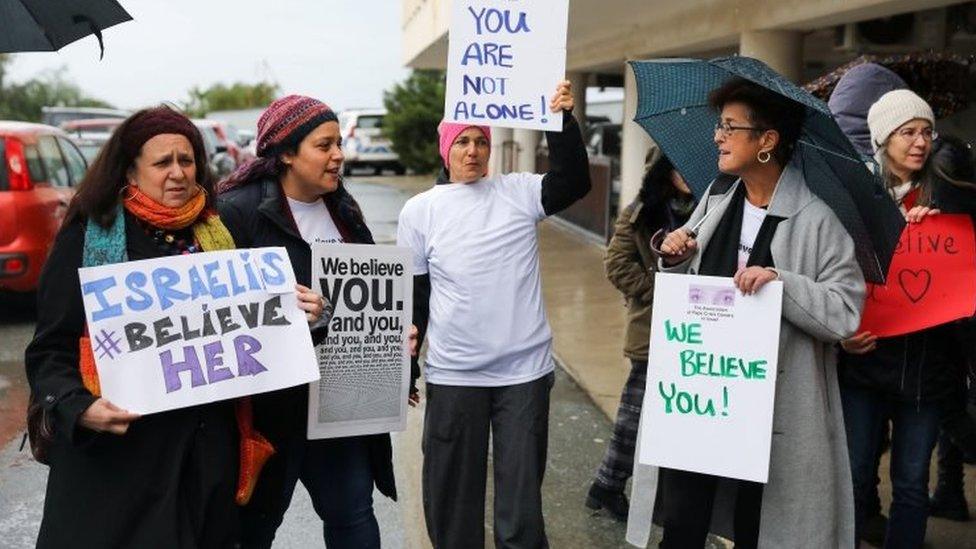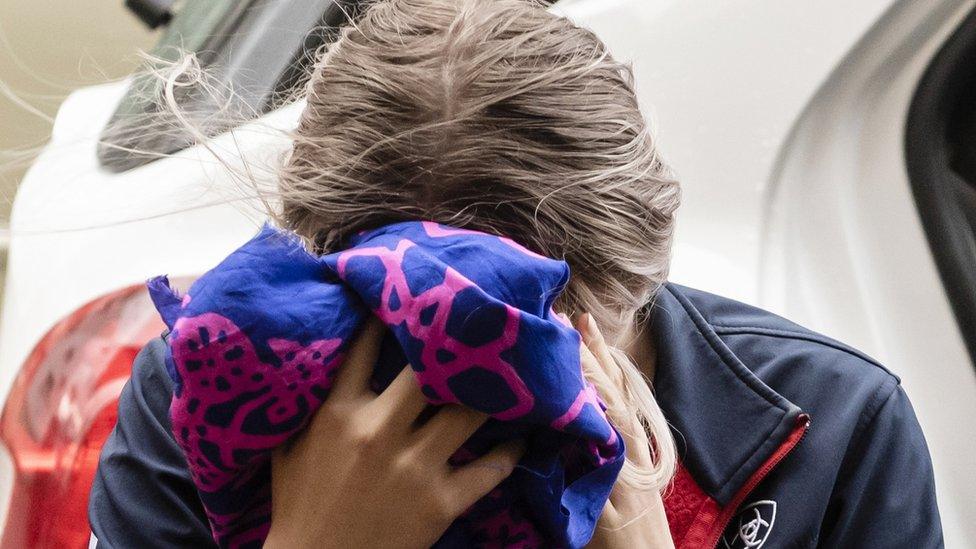Ayia Napa Briton sentenced over false rape claim
- Published
Protesters say they believe the British woman's rape claim
A British woman has been given a four-month suspended sentence after being found guilty of lying about being raped by a group of young Israelis in Cyprus.
The 19-year-old hugged her family and left court weeping after she was sentenced for public mischief.
Her sentence was suspended for three years, and she has been ordered to pay €148 (£125) in legal fees. She is is now on her way back to the UK.
Women's rights groups protested outside court ahead of the sentencing.
BBC correspondent Anna Holligan said the puffy-eyed teenager embraced her mother as chants of "We believe you," and "No means no," filtered into the courtroom from the protest outside.
Supporters from Cyprus and a group of 50 women who travelled from Israel gathered outside the Famagusta District Court on Tuesday holding placards.
The teenager's mother shouted "she's coming home" to the group following sentencing, and told reporters she felt "relieved".
Addressing the crowd, the teenager's mother said: "I just want to thank each and every one of you for turning up today, having belief, having faith and making sure we get justice."
The teenager was later pictured with her mother at Larnaca Airport ahead of their flight back to the UK.
In court, Judge Michalis Papathanasiou told the teenager he was giving her a "second chance".
The 19-year-old was put on trial and convicted in December after recanting a claim that she had been raped by a group of 12 young men in a hotel room in July.
She said Cypriot police had made her falsely confess to lying about the incident - something police have denied.
"We're pleased she's going home", lawyer Lewis Power QC says
The woman's lawyer, Lewis Power QC, told BBC News the case was "not finished by any means".
He said: "We will be seeking an expedited appeal to the Supreme Court of Cyprus and we will also be considering going to the European Court of Human Rights.
"We do not feel we have had justice in terms of how the trial progressed, the manner in which it was conducted, the initial police investigation and the fact that we feel she did not receive a fair trial."


When Cyprus gained its independence from the UK in 1960 it inherited the English Common Law system, so there are great similarities between its system and our own before then.
While both systems have moved on, there has been major reform of the UK criminal justice process which does not apply in Cyprus.
In the 1970s a series of miscarriages of justice cases, including the Guildford Four and Birmingham Six, highlighted shortcomings in the treatment of those detained by the police.
Since 1984 new legislation in the UK introduced codes of practice governing the rights of suspects in detention.
In enshrined, for instance, tape recorded interviews, the right to a solicitor, and the supervision and oversight of suspects by custody sergeants independent of the investigation.
This does not apply in Cyprus, where interviews are still hand-written.
In that sense the Cypriot criminal justice system provides less protection to suspects than the UK system does.
However, it is a fair trial system and criticisms that can be levelled at it, could be equally levelled at other countries who are signed up to the European Convention on Human Rights.
Once the appeal system in Cyprus has been exhausted, there could be an appeal to the European Court of Human Rights (ECHR) on the grounds that the system in Cyprus has breached the right to a fair trial.

During sentencing, the judge said he was "troubled" about the case.
"All the evidence shows that she had lied and prevented the police from doing other serious jobs," he said.
"Twelve people were arrested and seven of them were there for at least 10 days. That was also a serious offence.
"Her psychological state, her youth, that she has been away from her family, her friends and academic studies this year.
"This has led me to decide to give her a second chance and suspend the sentence for three years."
Israeli lawyer Nir Islovich, who represented four of the 12 men in the case, welcomed the decision. "What was important to us was that she would be convicted of the charges brought against her," he said.
"That happened with full adoption of the facts as presented by my clients."
Protesters outside court insisted she should never have been convicted.
'We won't be silenced'
Orit Sulitzeanu, head of the Association of Rape Crisis Centers in Israel, told BBC News the conviction was "unbelievable".
"She is not to blame at all," Ms Sulitzeanu said. "This sentence reflects backward thinking and not understanding the dynamics of rape. The judge here must learn what happens to the victim of sexual abuse."
She added: "This is a young lady, she will go to university, she will go to have a job and she has a criminal offence. It will influence her life. This four-months suspended sentence is bad from the beginning."

Orit Sulitzeanu (right) with supporters from Israel
Susana Pavlou, director at the Mediterranean Institute of Gender Studies in Cyprus, said the case had sparked a "culture of protest" in the country.
"This year it has been revealed how broken our criminal justice system is - broadly in terms of police and social services response to violence against women, and the lack of specialist services.
"It's heartening to see how this has ignited women's rights campaigners and a women's rights movement focusing on this issue.
"This is not going to go away, we will not be silenced."
The teenager told police she was raped on 17 July at the Pambos Napa Rocks Hotel.
Twelve men were arrested but later freed and returned home after she retracted her claims.
She was charged and spent about a month in prison before being granted bail in August ahead of her trial, at which she pleaded not guilty to causing public mischief by falsely accusing the group of raping her.
UK Prime Minister Boris Johnson was "pleased" she could now return to the UK, his spokesman said.
Downing Street said the UK government had highlighted its "concerns about the judicial process in this case and the woman's right to a fair trial" to the Cypriot authorities.
- Published1 January 2020

- Published30 December 2019
